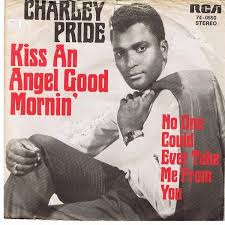| "Kiss an Angel Good Mornin'" | ||||
|---|---|---|---|---|
 | ||||
| Single by Charley Pride | ||||
| from the album Charley Pride Sings Heart Songs | ||||
| B-side | "No One Could Ever Take Me from You" | |||
| Released | October 23, 1971 | |||
| Studio | RCA Studio B, Nashville | |||
| Genre | Country pop [1] | |||
| Length | 2:02 | |||
| Label | RCA Victor | |||
| Songwriter | Ben Peters | |||
| Producer | Jack Clement | |||
| Charley Pride singles chronology | ||||
| ||||
"Kiss an Angel Good Mornin'" is a song written by Ben Peters, and recorded by American country music artist Charley Pride. It was released in October 1971 by RCA Victor as the first single from his 13th studio album, Charley Pride Sings Heart Songs (1971). It has since become one of his signature tunes and was his eighth song to reach number 1 on the country charts. [2] It was also Pride's only single to reach the top 40 on the pop charts, peaking at number 21 on the US Billboard Hot 100, [3] and also went into the Top Ten of the Adult Contemporary charts. It also reached number 19 on the US Cash Box Top 100. The song spent four months on the pop chart, longer than any of his other hits. Billboard ranked it as the number 74 song for 1972. [4]
Contents
Though missing the top 40 nationally, "Kiss an Angel Good Mornin'" reached the top 10 in Sydney, Australia, on 2NUR, peaking at number 7. In 2025, the song was selected for preservation by the Library of Congress for being "Historically, culturally, or aesthetically significant". [5]